Have you ever wondered about the land of the rising sun beyond the usual sushi rolls and sumo wrestlers? Japan, a nation rich in history, culture, and innovation, is a treasure trove of discoveries waiting to be uncovered. In this journey, we’ll explore 14 interesting things about Japan that are sure to leave you amazed.
So, buckle up and join us on this exciting exploration of cool Japan facts and the intriguing, sometimes crazy facts about Japan!
Why are these so many interesting things about Japan?
There’s something truly enchanting about Japan, a land where ancient traditions seamlessly blend with futuristic innovation. Imagine walking through bustling city streets, where neon lights dance alongside timeless temples, creating a tapestry of the old and new.
It’s a place where every corner holds a story, a cultural nuance or a delightful surprise waiting to be discovered. The charm of Japan lies in its ability to make you feel like you’re stepping through different eras, all in one day. Whether it’s the heartfelt hospitality, the meticulous attention to detail in everything they do, or the profound appreciation of nature, Japan has a way of captivating your heart and imagination like nowhere else.
Each visit feels like you’re unravelling a new layer of a beautifully intricate puzzle, leaving you yearning to explore more.
Here’s our top 14 interesting facts about Japan
👇 Scroll down to read more about the crazy facts about Japan
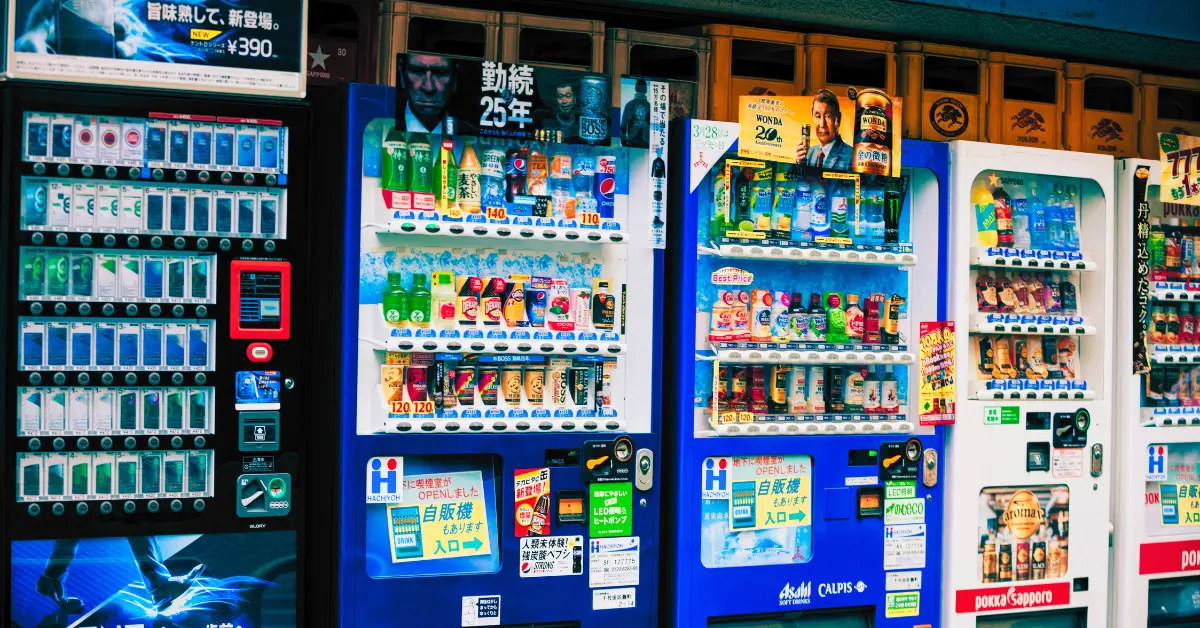 1. Japan is home to the highest density of vending machines in the world
1. Japan is home to the highest density of vending machines in the world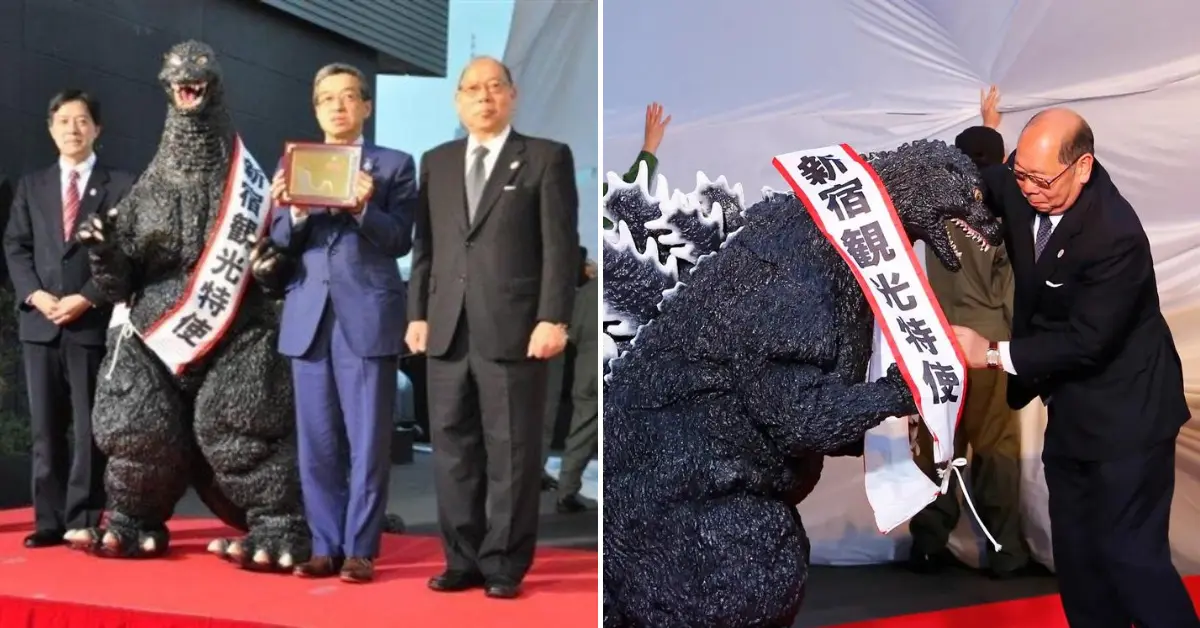 2. Godzilla is an official citizen of Japan
2. Godzilla is an official citizen of Japan 3. It’s considered polite to slurp your noodles
3. It’s considered polite to slurp your noodles 4. They use plastic food models to display their menu
4. They use plastic food models to display their menu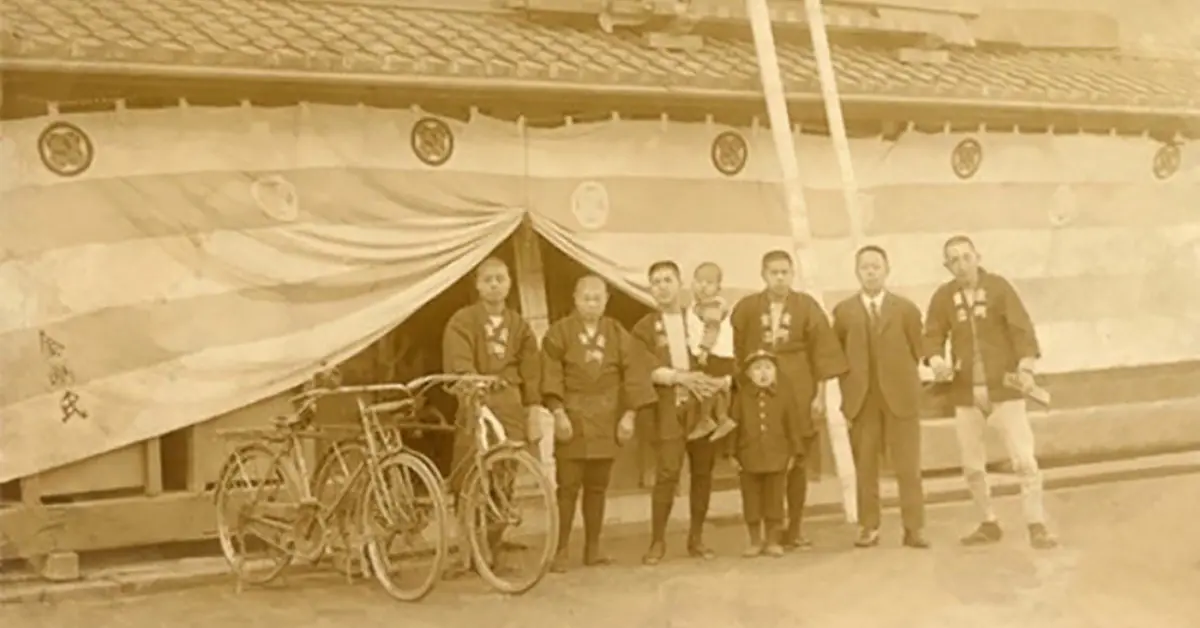 5. The world’s oldest continuously operating company is in Japan
5. The world’s oldest continuously operating company is in Japan 6. Japanese people are extremely honest
6. Japanese people are extremely honest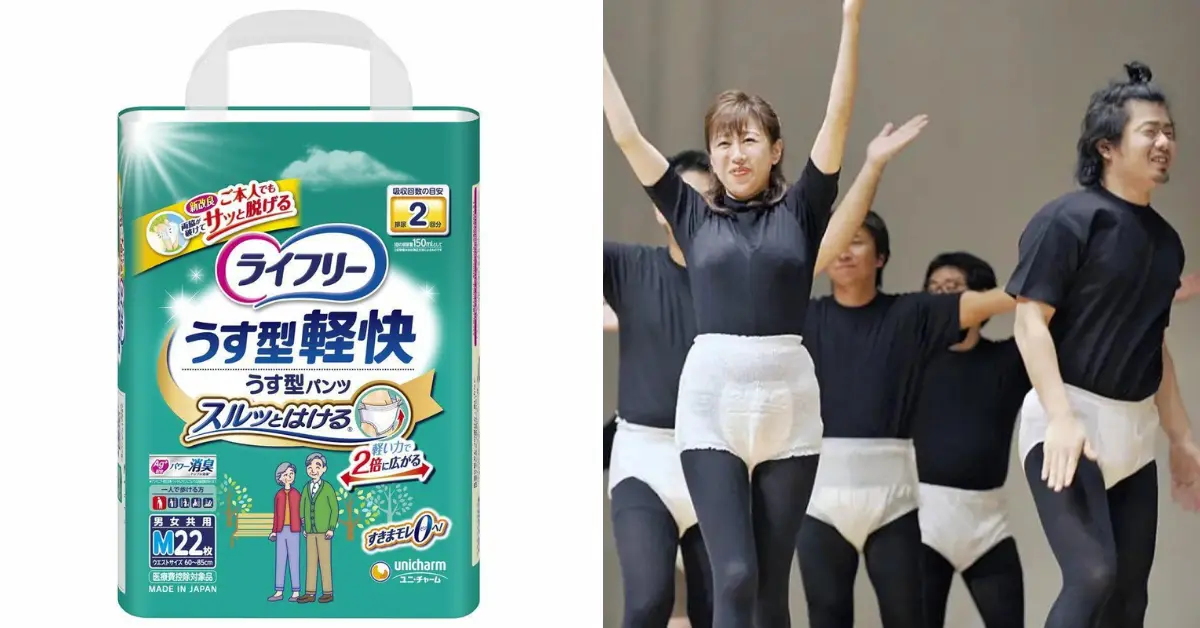 7. Japan sells more nappies to adults than babies
7. Japan sells more nappies to adults than babies 8. Millions of Japanese families eat KFC on Christmas Eve
8. Millions of Japanese families eat KFC on Christmas Eve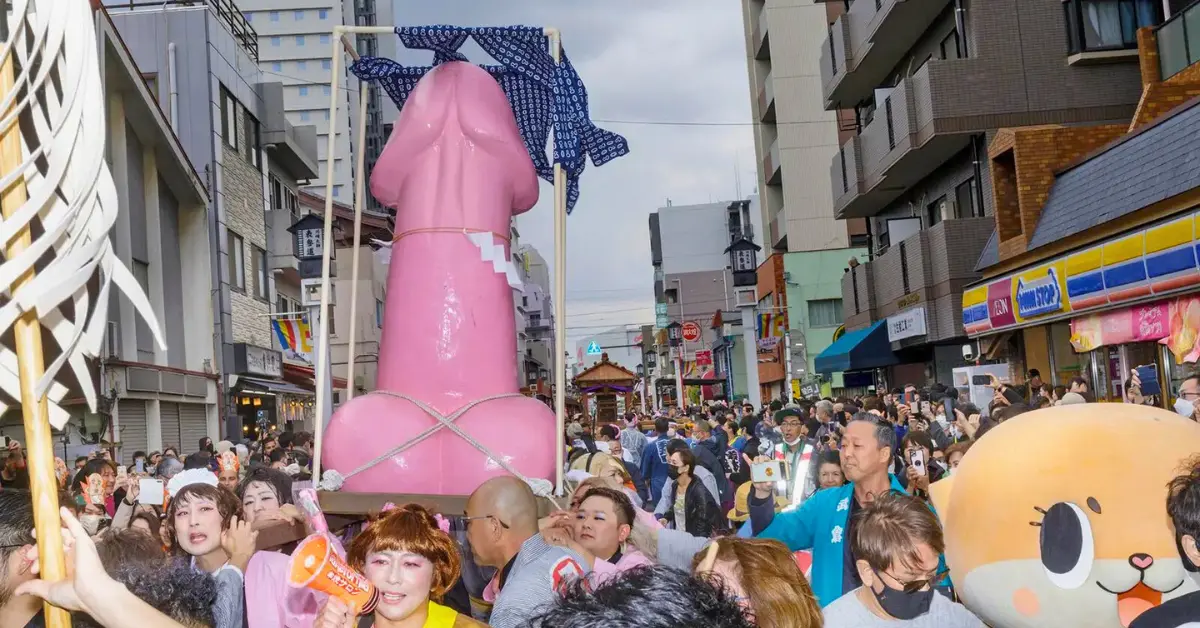 9. There’s actually a festival that celebrates the phallus 🍆
9. There’s actually a festival that celebrates the phallus 🍆 10. They grow expensive square watermelons for easy storage
10. They grow expensive square watermelons for easy storage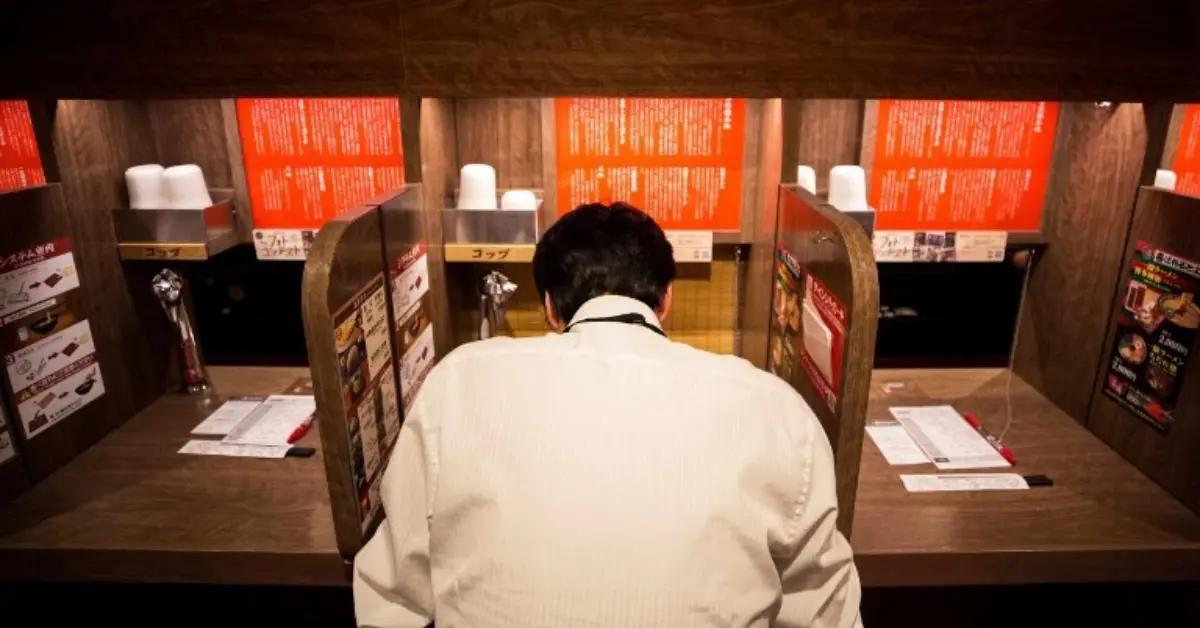 11. Dining solo is a completely normal and accepted practice
11. Dining solo is a completely normal and accepted practice 12. Japan is famous for capsule hotels (pod hotels)
12. Japan is famous for capsule hotels (pod hotels) 13. You can go-kart through the streets of Tokyo like real-life Mario Kart
13. You can go-kart through the streets of Tokyo like real-life Mario Kart 14. Japan has a fascination with rainbow-coloured foods
14. Japan has a fascination with rainbow-coloured foodsJapan is home to the highest density of vending machines in the world

An interesting fact about Japan is how its vending machines are not just a convenience, but a cultural icon. Picture this: walking through Tokyo’s neon buzz or Kyoto’s serene lanes, you’re never far from a vending machine. They’re everywhere, offering a mind-boggling array of items – from steaming ramen to umbrellas for those unexpected showers.
It’s fascinating how these machines mirror Japan’s innovative spirit, blending technology with day-to-day practicality. They symbolise the country’s efficient lifestyle; just a quick tap of a card, and there’s your hot coffee or a quirky gadget you never knew you needed.
Beyond their practical use, these vending machines are also canvases of creativity, adorned with vibrant art or themed in the most unexpected ways – imagine finding a sake dispenser or a machine that surprises you with mystery boxes! Truly, these vending machines are a small yet vivid reflection of the unique and captivating culture of Japan.
Godzilla is an official citizen of Japan

Here’s a crazy fact about Japan that perfectly captures its unique charm: Godzilla, the iconic movie monster, is not just a cinematic legend but also an official citizen of Japan!
It’s a delightful nod to Japan’s rich pop culture and its ability to intertwine the contemporary with tradition. Godzilla, once a symbol of post-war fears, has transformed into a beloved figure, representing various aspects of Japanese identity.
The decision to grant Godzilla citizenship is more than just whimsy; it’s a tribute to the character’s significant cultural impact. As a tourism ambassador, Godzilla embodies Tokyo’s allure, a playful twist considering its fictional reputation for terrorising the city.
This fun and quirky act, complete with a formal residency certificate for Godzilla, showcases Japan’s wonderful sense of humour and their unique way of embracing both their history and modern pop culture icons.
It’s considered polite to slurp your noodles
When visiting Japan for the first time, you’re in for a delightful cultural surprise, especially at the dining table. Imagine sitting down to a steaming bowl of noodles and hearing the harmonious symphony of slurping around you.
This isn’t just a casual dining habit; it’s a revered part of Japanese etiquette. In Japan, slurping your ramen, udon, or soba isn’t just acceptable, it’s considered good manners! It’s their way of saying, “This is scrumptious!” without words, a gesture deeply appreciated by chefs.
This unique practice isn’t only about showing appreciation; it also enhances the taste of the noodles and cools them down for a more enjoyable eating experience. So, while you’re exploring the vibrant and contrasting beauty of Japan, don’t forget to join in and slurp your noodles with gusto. It’s not just fun; it’s a respectful nod to the local culinary traditions!
They use plastic food models to display their menu

In Japan, there’s this fascinating practice called “Shokuhin Sampuru”, where life-like fake food models grace the windows of many restaurants. These aren’t your average food replicas; they’re works of art, crafted with such precision that they look almost good enough to eat. As you stroll down the vibrant streets, from Tokyo’s buzz to Kyoto’s charm, you’ll see these inviting displays, showcasing everything from the freshest looking sushi to bowls of steaming ramen. They’re more than just eye-catching; they’re incredibly helpful for tourists too.
Imagine you’re exploring Japan, not quite up to speed with the language. Reading menus can be tricky, right? Here’s where these models shine. You can simply point at the dish that tempts you, making ordering a delightful, hassle-free experience. It’s like a universal, visual menu, breaking down language barriers and enriching your culinary journey.
And it’s not just a Japanese thing; you’ll find similar practices in Vietnam. It’s a delightful way to bridge the language gap and dive into the local cuisine. Quite clever, isn’t it?
The world’s oldest continuously operating company is in Japan

In the heart of Tokyo lies a remarkable slice of history: Kongo Gumi, the world’s oldest company, in operation since the 6th century. Imagine, a business thriving for over 1,400 years!
It started with building temples and now stands as a testament to Japan’s rich architectural heritage. Kongo Gumi isn’t just a company; it’s a living bridge between Tokyo’s modern bustle and its ancient past. What makes it truly special is its embodiment of Japanese endurance and adaptability, maintaining its core values and craftsmanship through centuries of change.
This enduring company is not only a symbol of Japan’s commercial history but also a beacon of its timeless traditions.
Japanese people are extremely honest

The remarkable honesty in Japan is something that never ceases to amaze visitors. It’s woven into the very fabric of Japanese culture. Picture this: lost wallets returned without a single item missing, or mobile phones left in public places, only to be safely recovered.
These instances aren’t extraordinary in Japan; they’re daily demonstrations of a deep-seated integrity. This extends to everyday life too. In some shops, you might find goods left unattended, with just a small box for payments – a true testament to the mutual trust between people.
More than just rule-following, this honesty reflects a societal norm where respect for others and their belongings is inherent.
Japan sells more nappies to adults than babies

In a fascinating aspect of Japan’s unique society, adult nappies have begun outselling those for babies, highlighting the country’s rapidly ageing population.
This trend isn’t just about demographic shifts; it speaks volumes about Japan’s advanced healthcare and the high life expectancy of its citizens. It’s a heartening glimpse into how Japan prioritises the comfort and dignity of its elderly, with industries innovatively adapting to meet these changing societal needs.
Truly, an interesting fact about Japan that reflects its caring and adaptive nature.
Millions of Japanese families eat KFC on Christmas Eve

Now, here’s a quirky yet utterly fascinating fact about Japan that might take you by surprise: an estimated 4 million Japanese families celebrate Christmas Eve with a meal from KFC! Yes, you heard that right – Kentucky Fried Chicken has become an unexpected yet beloved part of Japan’s Christmas tradition.
This unique custom dates back to a clever marketing campaign in the 1970s. KFC Japan launched an advertising campaign titled “Kurisumasu ni wa kentakkii!” (Kentucky for Christmas!), and it quickly caught the public’s imagination. The idea was a hit, especially since traditional Christmas foods like turkey were not commonly available in Japan. KFC filled that gap with its festive ‘Party Barrels’, turning a fast-food chain into a Christmas staple.
There’s actually a festival that celebrates the phallus 🍆

One of the most interesting things about Japan is its unique blend of tradition with contemporary causes, perfectly exemplified by the Kanamara Matsuri. This “Festival of the Steel Phallus”, held annually in Kawasaki, might raise eyebrows with its parade of giant phallus-shaped sculptures. But, beyond its quirky exterior lies a celebration steeped in history, dating back to the Edo period.
Originally rooted in a local legend, today it symbolises fertility, childbirth, and matrimonial happiness. More than just a spectacle, it’s a festival with heart, contributing to sexual health awareness and HIV research. It’s a lively scene of laughter, music, and community, showcasing Japan’s unique way of embracing its past while making meaningful contributions to present-day causes.
They grow expensive square watermelons for easy storage
In Japan, a land brimming with innovation, even the humble watermelon gets a creative twist. These watermelons break the mould, quite literally, by being square. It’s a smart move for practicality – imagine trying to fit a rolling, round watermelon in your fridge. Now picture a neat, square one sitting snugly on the shelf.
This clever idea comes from growing the watermelons in special boxes, shaping them into these unique squares as they grow. But there’s a catch to this novelty: these square watermelons are quite the luxury, often seen as high-end gifts or stylish decor. They’re a testament to Japan’s blend of artistry and ingenuity, even in something as simple as a watermelon.
Dining solo is a completely normal and accepted practice in Japan

In Japan, dining alone is more than just convenient; it’s a celebrated aspect of the culture, embodied by the term ‘Ohitorisama’, meaning the art of doing things solo. It’s quite a sight in Japanese cities to see busy professionals, fresh from a day’s work, popping into a local eatery for some alone time. These moments aren’t about socialising but about relishing a meal in peaceful solitude, a time for personal reflection or simply enjoying a favourite dish.
Japanese restaurants are brilliantly adapted to this culture of solo dining. Picture cozy ramen spots and sushi bars with seats just for one, where you can watch chefs craft your meal. This celebration of independent dining isn’t limited to working adults; it’s a common choice for people of all ages, whether in a quaint café or an upscale restaurant. ‘Ohitorisama’ isn’t just a word; it’s a lifestyle in Japan, symbolising independence and the joy of one’s own company.
Japan is famous for capsule hotels (pod hotels)

You’ve probably seen those intriguing pod hotels on Instagram, a distinctly Japanese take on accommodation that’s far from ordinary. Picture this: a snug, futuristic pod replacing the traditional hotel room, offering just the right amount of space for a cosy sleep. These compact capsules, neatly arranged side by side and in layers, might remind you of a scene from a science fiction film. Despite their petite size, pod hotels in Japan pack a punch in comfort and efficiency, with features like ambient lighting and essential tech comforts.
Originally designed for busy workers needing a quick overnight stay, these capsule hotels have become a hit with travellers seeking an affordable yet novel experience. It’s a bit like stepping into the future while still being firmly planted in the present. Embracing the minimalist lifestyle, these hotels offer everything you need in a surprisingly small space.
You’ll find communal areas and sometimes even traditional Japanese public baths, blending modern innovation with classic cultural touches. Staying in a pod hotel isn’t just about finding a place to sleep; it’s about immersing yourself in an entirely different and uniquely efficient way of living.
You can go-kart through the streets of Tokyo like real-life Mario Kart
If you’re a young adult traveller looking for an unforgettable adventure in Japan, here’s something that might just top your list! Picture this: zipping through Tokyo’s bustling streets in a go-kart, reminiscent of the thrilling rides in video games. Although the famous ‘Mario Kart’ inspired tours have faded into memory due to a Nintendo lawsuit, the exhilaration of go-karting through Tokyo’s vibrant streets is still a huge hit among youthful adventurers.
Imagine yourself in a sprightly go-kart, with the wind playfully tousling your hair, as you weave through the city’s dynamic districts. This isn’t just another sightseeing tour; it’s an adrenaline-packed journey that offers a distinct and thrilling perspective of Tokyo. You’ll feel the pulse of the city, see the neon lights blur past, and experience the urban landscape in a way that’s as exciting as it is unique.
But here’s a word to the wise: while diving into this adventure, don’t forget the importance of safety. This kind of fun comes with its own set of challenges, especially navigating busy city streets. So, it’s a smart move to arrange travel insurance before you strap into your go-kart. Remember, it’s all about enjoying the exhilarating ride with peace of mind.
Trending go kart activities in Tokyo
Japan has a fascination with rainbow-coloured foods
In Tokyo, the trend of rainbow-coloured foods is not just about taste; it’s a visual and sensory experience. Imagine walking into a café and being greeted by a latte adorned with a rainbow, each colour blending seamlessly into the next. Or picture yourself biting into a soft, fluffy cotton candy, so large and colourful it feels like holding a cloud made of pastel rainbows.
These culinary creations are a testament to the playful and innovative spirit of Tokyo’s food scene. From the Nakano Broadway’s ice cream parlours serving towering rainbow soft serves to Harajuku’s snack bars with their eye-catching treats, each dish is a work of art.
Even the traditional Xiaolongbao gets a vibrant twist, offering a palette of flavours and colours that delight both the taste buds and the eyes. This love for rainbow foods in Tokyo goes beyond mere aesthetics; it’s a celebration of creativity, a visual feast that brings joy and wonder to everyday dining
Top Tokyo street food tours
Popular Japan tours for young adults for March
Check out these Japan tours for young adults – all available to book through TourRadar. Click here to explore additional tours.
[18-35.travel_filter country=”86″ limit=”10″]
Conclusion
So, there you have it – 14 crazy facts about Japan that showcase its unique blend of tradition and modernity. Whether you’re planning a trip or just curious, Japan has a lot to offer that will leave you amazed and inspired.





